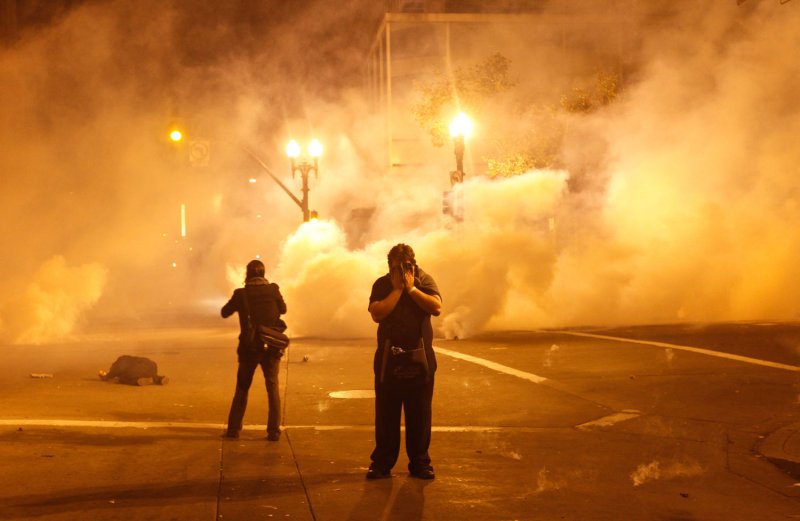1 of 14 | Tear gas billows on Broadway as police block the way to City Hall where the Occupy Oakland encampment was dismantled by police and protesters dispersed, in Oakland, California on October 25, 2011. UPI/Elijah Nouvelage |
License Photo
SAN FRANCISCO, Oct. 26 (UPI) -- Oakland officials acted Wednesday to limit Occupy protesters' ability to camp out in the city's central plaza.
City workers began erecting a chain-link fence around a grassy area of the plaza where protesters tangled with police the night before, the Los Angeles Times reported. About 350 people had camped out in the space until cleared out by police Tuesday.
The work progressed under the watchful eyes of a small group of protesters.
City officials said they intended to reopen the plaza to the public once the fence was completed, the Times said. Protesters could then use the space but not camp out there.
Demonstrators faced off with police in rolling protests Tuesday after an early-morning raid on the movement's encampment near city hall, the Oakland Tribune reported.
Witnesses said police lobbed tear gas at least three times to disperse an estimated 1,000 people who took to the streets 12 hours after police evicted about 300 people from the camp at Frank H. Ogawa Plaza. Police said 102 people were arrested.
"We had to deploy gas to stop people from throwing rocks and bottles at police," Interim Police Chief Howard Jordan said.
Protesters not arrested in an Occupy Atlanta police sweep did not return to Woodruff Park early Wednesday, despite being urged to do so by organizers.
In San Francisco, public health officials warned Occupy protesters their camp was an imminent health hazard, but police did not ask them to leave.
"Evidence of excrement, urine and vomit were observed throughout the park," the city health department said in a notice Tuesday. "Fecal material was observed on stairs and grass. A container of human waste was observed along the Embarcadero side of the park."
The San Francisco Chronicle reported about 200 people have been demonstrating at Justin Herman Plaza and were staying in about 50 tents and a community center as part of the anti-greed protests that began in New York as Occupy Wall Street.
Demonstrators said the urine odor was from homeless people who had been living in the park and volunteers had cleaned the park with mops and Pine-Sol.
There was no word if police planned to issue an order for protesters to leave the plaza.
About two dozen Atlanta police officers patrolled the perimeter of the park, now ringed by 4-foot metal barricades, The Atlanta Journal-Constitution reported.
Just before 1 a.m. Wednesday, police moved into the park to roust protesters and arrested 53 Occupy Atlanta demonstrators after issuing multiple warnings. Mayor Kasim Reed said more than 100 officers were involved in the operation.
Reed said the protests, which began more than two weeks ago, had cost the city about $300,000. He said Monday he would not evict the protesters until they spoke with area clergy to try to work out a solution.
A national poll released Tuesday said 46 percent of the public thinks the sentiment at the root of the Occupy movement generally reflects the views of most Americans.
The New York Times/CBS News poll also found two-thirds of the public said U.S. wealth should be distributed more evenly, seven in 10 said congressional Republican policies favor the rich, two-thirds object to tax cuts for corporations and a similar number support increasing income taxes on millionaires.
The nationwide telephone poll of 1,650 adults, conducted Wednesday through Monday has a sampling error of 3 percentage points.
The Occupy movement, which began in New York Sept. 17 and spread to more than 100 other U.S. cities, condemns what it sees as corporate greed, the influence of lobbyists on lawmakers and general U.S. social and economic inequities.















